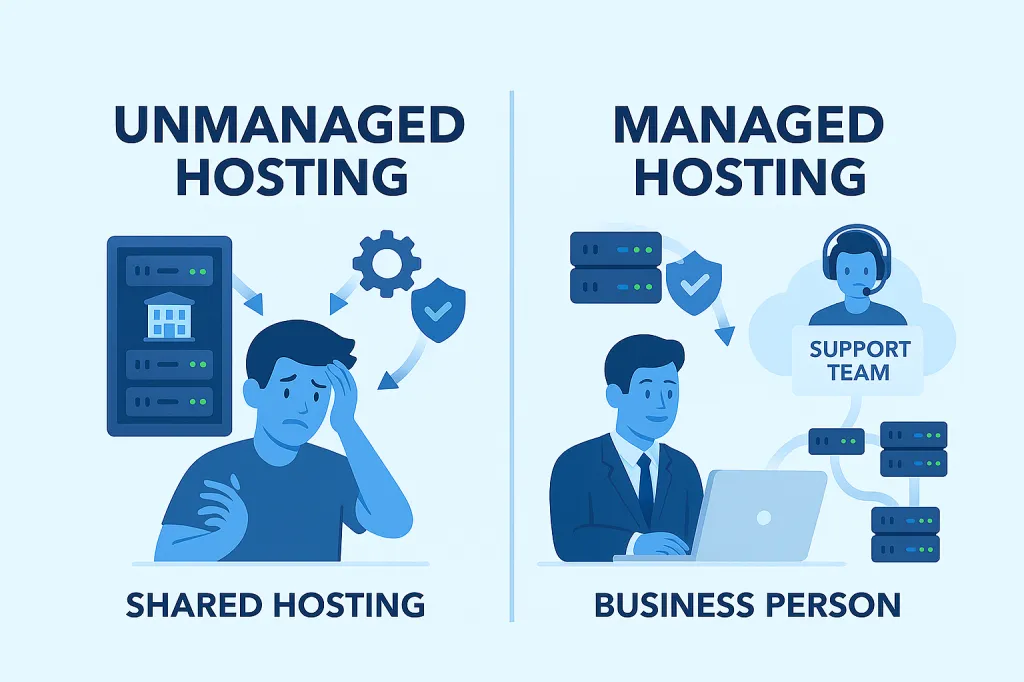Once you've decided on a hosting type like VPS or a dedicated server, you'll face another critical choice: should you get a Managed or Unmanaged plan? This decision has a huge impact on your cost, workload, and peace of mind.
Understanding the difference is key to avoiding future headaches. This guide will break down what each option entails so you can confidently choose the right path for your website.
What is Unmanaged Hosting? The DIY Approach
Unmanaged hosting is exactly what it sounds like: you are given a bare server with just an operating system, and everything else is up to you. Think of it like being handed the keys to a powerful, empty workshop. You have all the space and potential, but you are responsible for buying, installing, and maintaining all the machinery yourself.
With an unmanaged plan, YOU are responsible for:
- Installing the web server (e.g., Apache, Nginx).
- Installing the control panel (e.g., cPanel, or managing via command line).
- Handling all software updates and security patches.
- Configuring firewalls and malware scanning.
- Setting up and managing your own backup solution.
- Troubleshooting any software-related issues or errors.
Who is it for?
Experienced developers, system administrators, and businesses with a dedicated IT team who have the expertise and time to manage a server from the ground up.
Pros:
- Full Control: You have complete root access to customize the server environment exactly as you need it.
- Lower Cost: Because you're not paying for expert support and management, the monthly price is significantly lower.
Cons:
- Requires Expert Knowledge: You must be proficient in server administration, security, and networking.
- Time-Consuming: Server management is an ongoing task that can take significant time away from your core business.
- High Stakes: If something goes wrong—a security breach, a failed update, a server crash—you are solely responsible for fixing it.
What is Managed Hosting? The "Peace of Mind" Option
Managed hosting is a "full-service" solution. The hosting provider acts as your personal system administrator. Using our workshop analogy, this is like renting a fully-serviced space where the landlord ensures all the heavy machinery is installed, running perfectly, secure, and maintained. You just show up and focus on your work.
With a managed plan, the HOSTING PROVIDER is responsible for:
- Initial server setup and optimization.
- Proactive security monitoring, patching, and updates.
- Performance optimization to ensure your site is fast.
- Automatic, regular backups of your website.
- 24/7 expert technical support for any server-related issues.
Who is it for?
Business owners, agencies, bloggers, e-commerce stores, and anyone who values their time and wants to focus on growing their website, not managing server infrastructure.
Pros:
- Saves Time and Effort: Frees you up to focus on what you do best.
- Expert Support: You have a team of experts on standby to help you with technical problems.
- Enhanced Security and Performance: The server is optimized and secured by professionals.
- Peace of Mind: Automatic backups and proactive monitoring mean you don't have to worry.
Cons:
- Higher Cost: You are paying for the convenience and expertise, so the price is higher.
- Less Flexibility: You may have restrictions on what software you can install to maintain the stability of the managed environment.
Conclusion: How Do You Choose?
The decision boils down to a simple trade-off: Time and Expertise vs. Money and Control.
- Choose Unmanaged Hosting if you have the technical skills, the time to dedicate to server administration, and need full control over a custom environment on a tight budget.
- Choose Managed Hosting if you are not a server expert, you value your time more than the extra cost, and you want the peace of mind that comes with having an expert team managing your server's health and security.
For the vast majority of website owners, from bloggers to small businesses, Managed Hosting is the recommended choice. The extra cost is a small price to pay for the immense time savings and security it provides.





